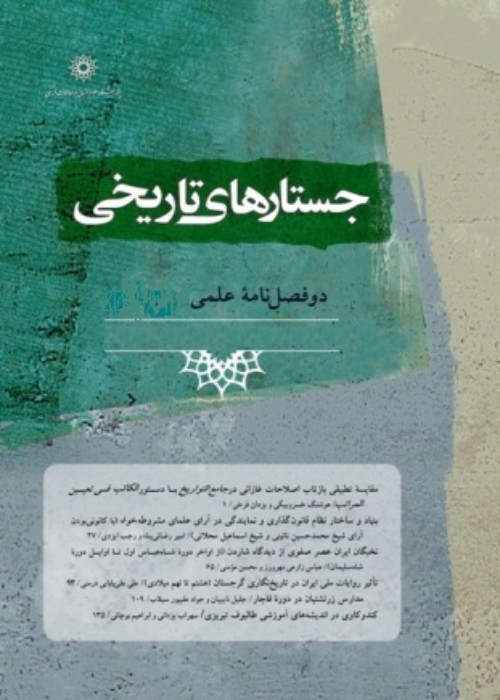Arguments against Amir Kabir's Reforms: A Study Based on Rational Choice Theory
Author(s):
Abstract:
Analyzing the arguments of opponents of Amir Kabir’sreforms، the authors of this article used theRational Choice approach as a general theory in historical sociology to generate acausal narrative to explain the reasons for internal opposition to Amir Kabir’s reforms. For this purpose، the reform opponentswere divided into four groups: clergymen، courtiers، governors، and the women of the Harem. Rational Choice Theory، in which the individual (here the reform opponents) is causal agent، and the instrumental rationality he uses (which here led to their opposition to reforms) is causal mechanism، was used to clarify the rational process of their opposition to reforms. Then، the arguments of the four groups were analyzed، and the first group was omitted based on John Stuart Mill''s comparative method. The common arguments were finally recognized using Mill’s method of agreement and methodofconcomitantvariation. They were negligence ofopponents’ position and social class، violation of the citizen''s rights، and possible reduction of royal power. These arguments show that the opponents of Amir Kabir''s reforms were more concerned with their individual and class benefits.
Keywords:
Language:
Persian
Published:
Jostarha-ye Tarixi, Volume:4 Issue: 1, 2013
Pages:
45 to 77
magiran.com/p1187266
دانلود و مطالعه متن این مقاله با یکی از روشهای زیر امکان پذیر است:
اشتراک شخصی
با عضویت و پرداخت آنلاین حق اشتراک یکساله به مبلغ 1,390,000ريال میتوانید 70 عنوان مطلب دانلود کنید!
اشتراک سازمانی
به کتابخانه دانشگاه یا محل کار خود پیشنهاد کنید تا اشتراک سازمانی این پایگاه را برای دسترسی نامحدود همه کاربران به متن مطالب تهیه نمایند!
توجه!
- حق عضویت دریافتی صرف حمایت از نشریات عضو و نگهداری، تکمیل و توسعه مگیران میشود.
- پرداخت حق اشتراک و دانلود مقالات اجازه بازنشر آن در سایر رسانههای چاپی و دیجیتال را به کاربر نمیدهد.
In order to view content subscription is required
Personal subscription
Subscribe magiran.com for 70 € euros via PayPal and download 70 articles during a year.
Organization subscription
Please contact us to subscribe your university or library for unlimited access!



